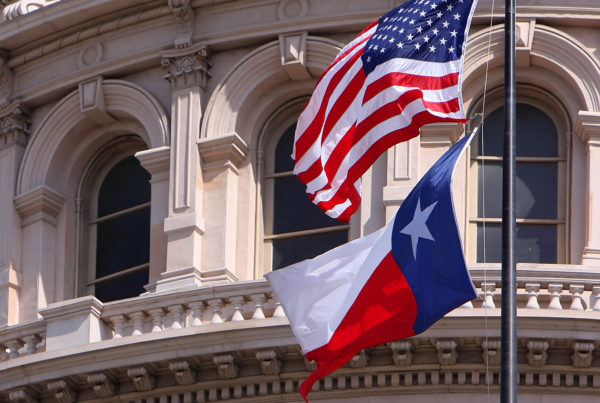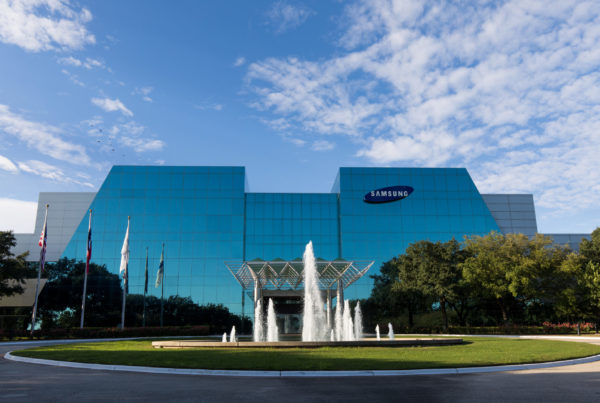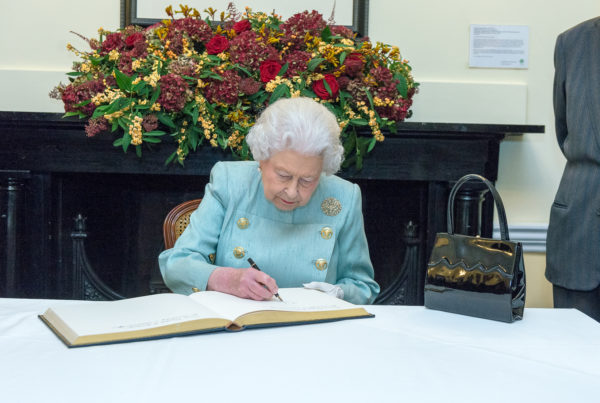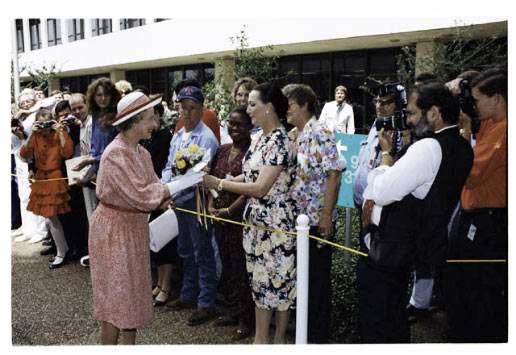From the Fort Worth Report:
Mathiew Weiss always wanted to fly. As a child, Weiss remembers seeing the planes take off at the airport when his father went on business trips.
“From there on, it was watching videos and toys and things like that,” he said. “And it’s just something I’ve always wanted to do.”
After working as a chef for 30 years, Weiss, 49, decided to pursue his dream. After getting his private pilot license, he enrolled at Tarrant County College’s program, located at Alliance Airport. He graduated in summer 2020, and is working as a certified flight instructor at TCC through Envoy Air’s cadet program to gain the hours necessary to become a captain.
Students such as Weiss aren’t having a tough time finding jobs, said Clint Grant, dean of TCC’s aviation, business and logistics division.
“They’ll probably have a job before they graduate,” Grant said.
Airlines have been scrambling to hire more staff as the demand for air travel has increased since the start of the pandemic. Worker shortages in the aviation industry spurred cancellations, delays and flight cuts. College programs are training students to enter the pilot and aviation workforce, but experts say it will take time to refill the worker shortages.
The aviation industry’s workforce challenge
Because of financial uncertainty at the beginning of the pandemic, major airlines offered early retirement and buyouts to pilots to save money. Tens of thousands of airline staff took the buyouts, according to reports.
As summer travel ramped back up and exceeded pre-pandemic levels, the U.S. commercial aviation industry wasn’t ready to meet the demand with staffing, said Erin Chernak, an industrial organizational psychology professor at the University of Texas at Arlington.
Fort Worth-based American Airlines cut more than 30,000 flights from its schedule in November because of staff shortages, according to The Dallas Morning News.
It’s more of a systemic problem than a shortage of pilots that’s causing flight delays, Chernak said.
“A shortage of mechanics can directly contribute to ripples that lead to cancellations,” she said. “But then that in turn can lead to issues and challenges with securing cabin crews and pilots who have enough hours because they haven’t been stuck waiting and timing out on their clocks.”
A Boeing workforce study estimates that 602,000 new pilots, 610,000 new maintenance workers and 899,000 cabin crew workers will be needed to maintain the global commercial aviation industry over the next two decades.
Barriers to entry make filling shortage time intensive
Universities around the country knew the shortage was coming, but it came sooner than expected due to the pandemic, Chernak said.
The Aerospace Industries Association report showed an aging workforce, and predicted 41% of aerospace workers would retire by 2017. At Boeing, for example, 56% of the company’s engineers are 50 years old or older, and it would take 10 to 20 years to replace them, the report said.
It takes time to train pilots. Students have to study for two years to complete the program. Then, pilots need 1,500 hours to become a commercial pilot to earn an Airline Transport Pilot License, which is required by the Federal Aviation Administration. Mechanics have to have more than 2,000 hours of training, Grant said.
In the 2021-2022 academic year, Tarrant County College graduated 187 from its aviation maintenance technician program and 51 pilots. Pilot program graduates’ first jobs are typically flight instructors so they can build enough flight hours to earn 1,500 to become a commercial pilot. After that, they are typically hired at regional carriers such as Envoy Air or Sky West, Grant said.
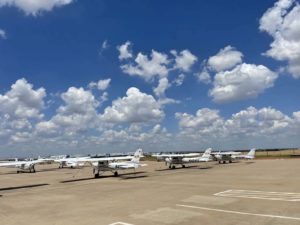
Planes parked at the Tarrant County Colleges Erma C. Johnson Hadley Northwest Center of Excellence For Aviation, Transportation and Logistics. Students fly the planes to earn their degree in order to eventually become pilots.
Photo by Seth Bodine / Fort Worth Report
TCC’s program is one of the only public options in North Texas, Grant said, and private programs tend to be more expensive. But the program can only have about 150 students at a time based on the number of planes they have available.
“We’re running pretty much at maximum in our flight program, and we have been at max with our aviation maintenance program for probably a solid 10 years now,” Grant said. “We just cannot run enough students through these programs, more demand than we have seats for.”
Another challenge is cost. ATP flight school estimates it costs $91,995 to become a pilot without any experience and $71,995 with a private pilot license.
Grant estimates students pay $70,000 to $90,000 to go through the pilot program at TCC, but they do have financial aid. In comparison, it takes about $7,000 to become a mechanic, he said.
Regional carriers face more of a demand to fill cockpits than legacy carriers, Capt. Ric Wilson, vice president of flight operations for American Airlines subsidiary Envoy Air, said. He estimates regional carriers, flights in aircrafts that have 80 seats or less, represent about 60% of domestic flights in the U.S. They hire roughly 600 pilots a year.
Envoy partners with universities such as TCC to recruit students into their cadet program. Envoy hires and places students to teach as instructors to gain hours they need in order to become a pilot. The company created the program more than 10 years ago, Wilson said.
The company hasn’t had trouble supplying new pilots, Wilson said. Pay incentives keep improving, he said. The company has first officers that come to work for Envoy that make just shy of $100,000 a year.
One challenge is that legacy carriers are hiring a lot of the company’s captains, he said.
“It is creating a bit of a bubble and a challenge there,” Wilson said. “So we’ve had to adjust the size of our line and importance to that demand. We’re attracting pilots from other carriers now to fill those demands.”
Former chef Weiss feels as if he’s investing in a secure future by becoming a pilot. The sky’s the limit, he says.
“If we were to fall into a depression, I’m the one that can make the soup and the bread for people to stand in line,” Weiss said. “That’s job security. This is job security as well, with the demand that they have out there. It’s a no-brainer.”




